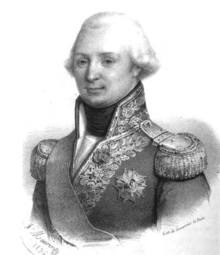Louis Thomas Villaret de Joyeuse
| Louis-Thomas Villaret-Joyeuse | |
|---|---|

Portrait of Villaret-Joyeuse, by Antoine Maurin
|
|
| Born | 29 May 1747 Auch |
| Died | 24 July 1812 (aged 65) Venice |
| Allegiance |
|
| Service/branch |
|
| Years of service | 1778 — 1797 |
| Rank | Vice-admiral |
| Battles/wars | |
Louis-Thomas Villaret de Joyeuse (Auch, 29 May 1747 – Venice, 24 July 1812) was a French admiral.
After serving in the Indies under Suffren, Villaret rose in rank during the early stages of the French Revolution. He was in command of the French fleet during the Glorious First of June, where, at great costs for his forces, he successfully drew the British away from a vital convoy. He led the French fleet during the disastrous Croisière du Grand Hiver, and commanded at the Battle of Groix, where he faced an inferior British force but failed to prevent Cornwallis's Retreat. He was relieved when he refused to served for the disastrous Expédition d'Irlande.
Villaret was then elected at the Council of Five Hundred. He joined the Club de Clichy, a party promoting colonies and slavery, and harbouring Royalist sympathies. After the Coup of 18 Fructidor, Villaret was to be deported to Cayenne, but went into hiding long enough for his sentence to be commuted to exile to Oléron, where he went willingly.
Reinstated in 1801, Villaret took command of the naval component of the Saint-Domingue expedition, and was appointed governor of Martinique and Sainte-Lucie. He served in this capacity until the British Invasion of Martinique in 1809.
Returned to France, Villaret fell in disfavour for his perceived weak resistance against the British. After two years, Napoléon pardonned him and appointed him governor of Venice. Villaret died there of edema on 24 July 1812.
Louis-Thomas Villaret was born in Auch, in Gascony, to the family of a fiscal officer.
Unable to enter the elite naval schools, he entered the navy as a volontaire in 1768. Promoted to Lieutenant in 1773, he served as a lieutenant on the 32-gun frigate Atalante in the Indian Ocean. In 1778, unemployed in Pondicherry, he volunteered his services to the governor de Bellecombe during the siege of Pondicherry, earning the rank of capitaine de brûlot.
...
Wikipedia
